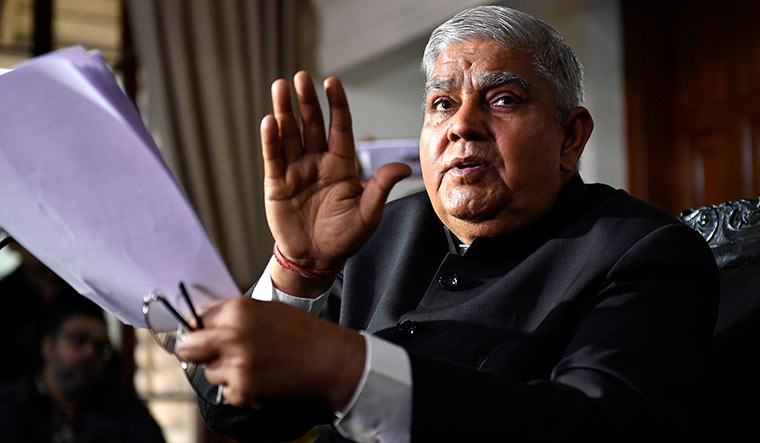Following your recent meeting with Home Minister Amit Shah, you said West Bengal was facing internal disturbance. Could you elaborate?
There have been numerous instances. Even the constitutional head, as chancellor, could not attend the convocation of [Nobel Laureate Abhijit Banerjee] at the University of Calcutta on January 28. This was a repeat of what had happened a few weeks ago at Jadavpur University, when a handful of people could generate such a situation (Dhankhar’s convoy was blocked and slogans raised). The state machinery was apparently either in silence or in support thereof. This is an outrageous breakdown of law and order, very close to anarchy.
What role did the police play?
The police have a deeply partisan approach—working as an extension of the ruling party. Their systemic, antagonistic stance towards the political workers not belonging to the ruling party is cause for concern for all believers in democracy.
Has the home minister assured you of any action?
I apprised him of my perspective on various issues, but I would not like to divulge more given the sensitive nature of the issues discussed.
You instructed the state election commissioner that the civic body elections next month should be conducted freely and fairly. You may have discussed this issue with the Centre, too. But, given that the state election commission is autonomous, would your directive effect any change?
I do not believe in analysis of failure. I also do not believe in doing a postmortem. I interacted with the state election commissioner to ensure peaceful, orderly and fair polls; unlike in 2013 and 2018, when elections were marred by violence and intimidation. I suggested that the election commissioner look into employing neutral forces for the elections.
There can be no issue with my advisory to the commission because, as a constitutional body, it is obligated to provide a level playing field.
The commission may, and surely should, in required situations, take recourse even to transferring officials and requisition a neutral force in the interest of ensuring fair and peaceful polls.
Are you happy with the steps taken?
I will see whether everything [is heading] in the right direction. The district magistrates have met the commissioner, grievance cells have been opened, and there was a meeting with the opposition parties before declaring the dates of the elections.
If they fail, will you step in?
We will cross that bridge when the time comes.
Does your instruction to the election commissioner mean that you would play a key role in the 2021 elections?
I would do everything possible to protect the Constitution.
Your meeting with the home minister raised a lot of eyebrows.
Why? Did the earlier governor not meet the home minister?
But that did not make headlines.
That is not my fault.
Many see it as a step towards imposing President’s rule in Bengal.
I have no comments on this.
You sought a report from the Mamata Banerjee government on the spending on anti-CAA advertisements.
Yes, I sought it on February 4. How can the government spend such a huge amount of public money against the law of the land? Why has the High Court imposed a blanket ban on the advertisements? Why has the state government not gone to the Supreme Court against that order?
Because that is an interim order and the case is still on.
One can go in the middle [of the proceedings].
What do you find wrong about the campaign, apart from the fact that it was against a law passed by Parliament?
The advertisement was in print, and on hoardings and television. The ruling party also put out the ads. Government money was spent to benefit the ruling party. There is another worrying point. The chief secretary, home secretary, police commissioner and other senior officers were seen in the campaign. It is complete politicisation of bureaucracy.


